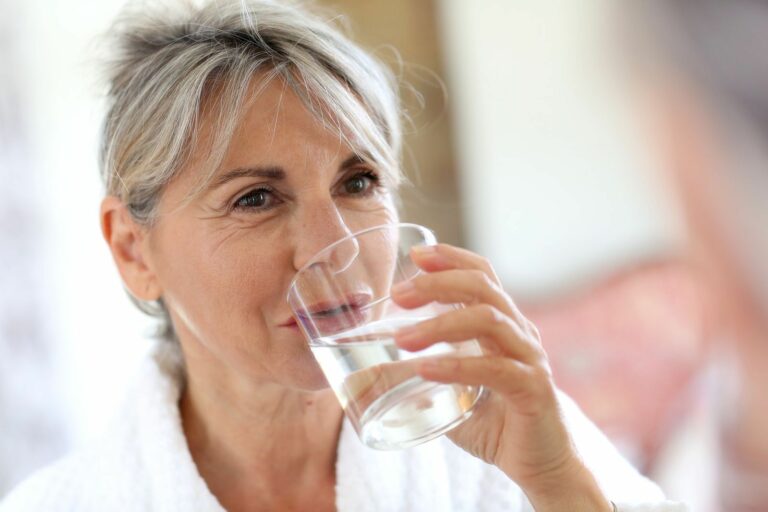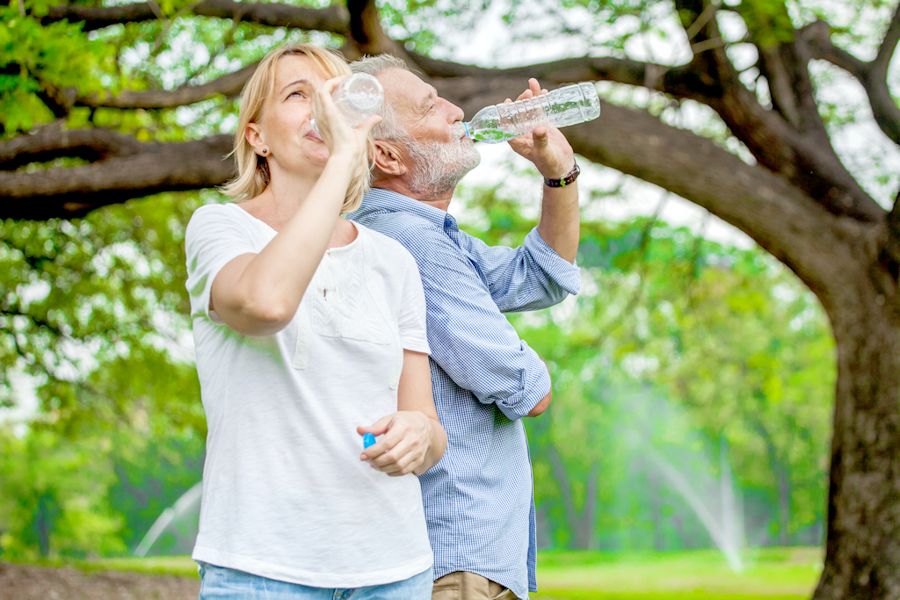
Drink up! Water is Key to Good Health
Water may not pack a whole lot of taste, but it sure packs a lot of value when it comes to your health. Our bodies depend on water. A person may be able to last weeks without eating, but only a matter of days without water.
Drinking water is about much more than just quenching thirst. Most of the major systems in your body depend on water. To work the way it should, your body must remain well hydrated. However, the human body is constantly losing water through bodily functions and does not produce water on its own. That’s why it’s so important to keep your body well hydrated by drinking plenty of water and consuming other fluids and/or foods containing water.
Water helps regulate body temperature, aids in digestion, enables your body to flush out waste, and can reduce constipation. Water carries nutrients to body cells and keeps tissues moist, including your eyes, nose, mouth, and skin. When a body does not get enough water, it becomes dehydrated and dehydration can cause a variety of health issues and even lead to serious complications.
A person can become dehydrated at any age, but dehydration is especially problematic when we are in our later years. Seniors are far more likely to fall victim to dehydration as a result of changes in the body related to the aging process.
Awareness of the sensation of thirst becomes less obvious with age, which can greatly reduce the desire to drink. Our bodies also contain less water in later years and that means we can become dehydrated faster than when we were younger.
Many older people take various medications, and some of these medications may affect the amount of water we should be drinking. Speak with your doctor about fluid intake and how much water you should be drinking each day. The amount of water an individual needs may depend on other factors as well, such as body size and metabolism.
Tips to Increase Hydration and Avoid Dehydration
- Don’t wait. Do not wait until you feel thirsty to have a glass of water. Thirst is not the best way to gauge how much water your body needs. Our older bodies are often in need of water before we feel thirsty.
- Hydrate frequently. Take breaks in your day to enjoy a glass of water. If you find it hard to down a full glass of water in one sitting, try drinking small amounts frequently throughout the day.
- Add flavor. To make water a little more flavorful, squeeze in some fresh lemon, lime, or orange juice. Floating a few slices of cucumber in your glass will also give water some flavor.
- Begin early. You may want to drink a refreshing glass of water as soon as you get up in the morning to start you off on the right foot.
- Eat foods high in water content. Many fruits and vegetables are great sources of water. Watermelon is true to its name and packed with water.
- Watch out for symptoms. If you feel tired or dizzy, do not assume right away that it means you are tired. These are also signs of dehydration. You may feel much better if you have some water.
- Consider the weather and climate where you live. Remember, high temperatures and humidity increase fluid loss through perspiration so it is important to drink more water to compensate.
- Take plenty of bathroom breaks. As we get older, we need to visit the bathroom more often. Although it may be tempting, never try to reduce the number of visits you make to the bathroom by drinking less water. You could easily end up dehydrated.
- Watch caffeine intake. Be cautious about how much of your fluid intake comes from drinks containing caffeine, like coffee, tea, and soft drinks. While the water in these drinks does help with hydration, caffeine can offset the benefits because it increases you body’s loss of water.
- Check the color of your urine. If you are drinking enough water and are well hydrated, your urine should be light in color and free of odor. If you are dehydrated, your urine will be more concentrated. It will have a darker yellow color and stronger odor.
- Try the pinch test. Pinch a little bit of skin on the back of your hand between two fingers, hold it for a couple seconds, and then release. If the skin goes back to normal quickly, you are well hydrated. If the skin holds the shape made by the pinch, you are probably dehydrated. According to MedlinePlus, produced by the National Library of Medicine, health care workers use the pinch test to assess skin turgor, a sign of dehydration.
Symptoms of Mild Dehydration
If you experience any of the symptoms below, your body may be trying to tell you something… you may need to hydrate. Drink small amounts of fluid frequently until you feel better. Don’t let your symptoms become severe. If your symptoms do not improve, consult a medical professional.
- Thirst
- Dry mouth and/or throat
- Dry mucus membranes in your nose
- Decreased tears
- Fatigue
- Headache
- Light headedness/dizziness
- Decreased urination
- Darker yellow urine
- Dulled thinking
Symptoms of SEVERE Dehydration
Severe dehydration can be dangerous and lead to life-threatening conditions that require immediate medical attention. If you experience any of the following symptoms and/or think you may be severely dehydrated, call your doctor or go to the hospital.
- Intense thirst
- Extremely dry mouth, nose, eyes, and/or skin
- Dimmed vision
- Lack of perspiration despite warm temperatures
- Little or no urination
- Rapid heart beat
- A drop in blood pressure
- Muscle spasms/seizures
- Fainting/unconsciousness
- Fever
- Delirium


Age Adds Flavor
We are not old, we are seasoned!
Don’t forget to visit us on FACEBOOK!
